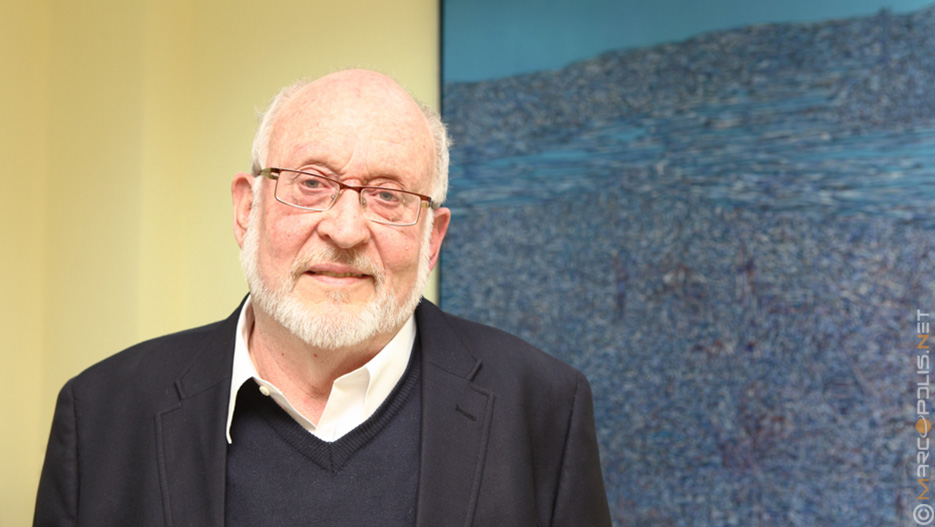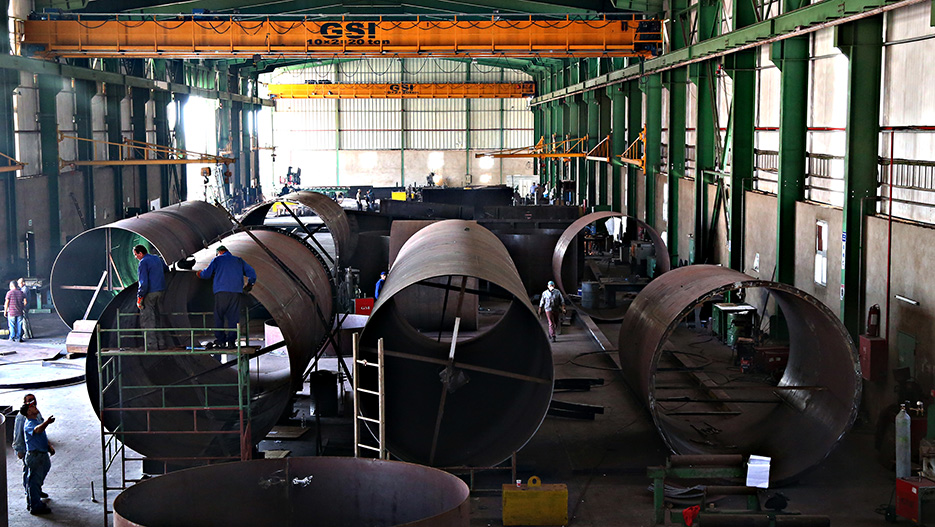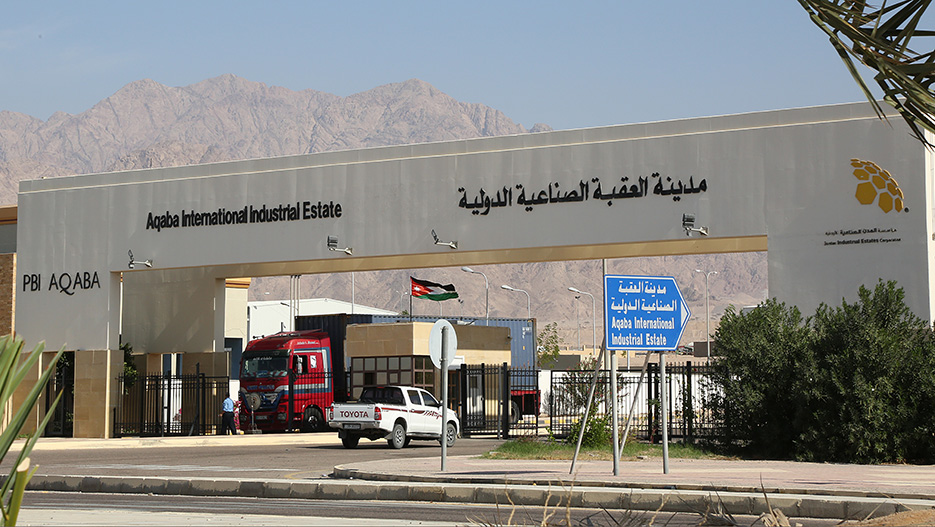PBI Aqaba Industrial Estate Is Successfully Proving Jordan’s Manufacturing Potential
“The total investment up to now in our estate exceeds 250 million US dollars. The goal is to reach 600 million US dollars by the end of developing the whole area of our estate.”
Interview with Sheldon Fink, Chairman & CEO of PBI Aqaba Industrial Estate

Aqaba is an attractive investment destination for many businesses so in your opinion how is Aqaba standing out? Is it the status of a special economic zone (SEZ)? How would you characterise the city at the end of 2015 from an investor perspective?
Let me briefly talk about ourselves; PBI Aqaba is the manager and the developer of Aqaba Industrial Estate. We are a partnership registered in the UK and we are managing and developing the estate according to our Concession contract with the Jordanian government. The partners are from the US, the UK and Turkey. We have been operating for the past 9 years. We have been marketing an area of 700,000m2 where the infrastructure is already in place, and also we are working on another 500,000m2 that will also be fully furnished with the needed infrastructure, both with a very highly developed performance. The 500,000m2 space is in an undeveloped area that we expect to develop within the coming 3 to 5 years. The total investment up to now in our estate exceeds 250 million US dollars. The goal is to reach 600 million US dollars by the end of developing the whole area of our estate.
We have already signed an agreement and we expect that we shall start developing a 1 million m2 area of new industrial zone as a partnership between us and the Chinese. We expect to start on this by the end of 2017. Currently if we have any investors ready from China, we have enough space here on our estate to accommodate them so they can start their operations now.
We have been based in Aqaba for about 10 years. When we came to Aqaba it had about 80,000 people and today it has almost twice that number. The GDP of the city has also grown similarly over the past ten years. There has been a lot of investment in infrastructure. Some of the businesses here are succeeding quite well. The advantage of Jordan and Aqaba is the location; it is very well placed in the Middle East region and Jordan is perceived as, and is in fact a safe haven. Also, Jordan is a country that has reasonably good relations with everybody and therefore you can market to every country in the region from here; whilst there are other countries that might be more advanced but cannot market because of various political disputes. We like Aqaba because of its location and we like Jordan because it is safe. We like it because we have been quite successful in our business here.

What role is the Aqaba International Industrial Estate playing in attracting investments to the region? What are the highlights of your operations during the past year?
We have been here for ten years but there have been different periods. To begin with, when we came here there were just two buildings in the dessert. The town was 10km from here and there was nothing here. Therefore we couldn’t take a marketing strategy to go international. We had three phases. First of all we said “let´s get some Jordanian customers”. After that we could market to the region and so we said “let´s get some regional customers”. Then after that we did go international. The third phase that we are in now has been for less than two years. We are beginning to see results on that but strategically the first step on was to ask “who would possibly want to be here?” even though we had a good thing to offer. So as I said, first it was local, then regional and then international.
The second thing was that the vision of Aqaba, held by the authorities when we first came here, did not give an important role to industry. They said they wanted 50% tourism, 30% port and 20% industry but since the people only have a certain number of hours to work and a certain amount of money the last 20% never got any attention at all. That changed in the past two or three years. It changed because people began to notice that the investments here per job created in industry and logistics were much less than in any other sector so Jordan with a limited amount of money could create more jobs through light and medium industry and logistics than they could from sectors that were emphasised to begin with. Our contribution has been first to convince everybody here that one could develop a certain kind of industry in Jordan and especially in Aqaba, which we have succeeded to do, and secondly that the kind of businesses that we were attracting were very good for creating employment in relation to the amount of money that was invested per job.
The advantage of Jordan and Aqaba is the location; it is very well placed in the Middle East region and Jordan is perceived as, and is in fact a safe haven.
What is the estate’s strategy?
The main objective is to be an example for proving to the Jordanian government that Aqaba can be a great manufacturing location. That is something they didn’t believe at all and now they are starting to believe it. That is good for our business but it is also good for Jordan. Part of the strategy is to say “look at what we are doing and see how it works so that then you can do more of this”. The other thing is that by doing local and regional marketing which is what we were doing for 7 or 8 of the 10 years that we have been here, it brought us to a certain level which involves doing about 100,000m2 a year of sales, and rentals of land per year. I don’t believe that in the market that we have succeeded in, that there is going to be a lot of growth. It is good growth above that level of development annually to do 100,000m2 of business a year but that is not enough. So now the strategy is to go international and presently we are giving a main focus to China, particularly the area of Shenzhen in China. It is a city that has approximately twice the population of Jordan and five times the GDP of Jordan. We think that it is a good match and that the amount of business we can bring from there could let us grow to a different level than we have been at up until now.
Could you name some examples of industries that you have attracted?
We have metals engineering companies. One example is a company that fabricates large components for power stations i.e. smoke stacks, cooling systems and boilers etc. We have a company that has been operating here for about 4 years in that field. Another is a factory which produces aluminium powder, aluminium wire and various other industrial products. Both are very large operations which both occupy 40-45,000m2 of land and employ hundreds of people. There is another industry that fits into metals engineering and also what I call the security related business. It is a rather large company that does armoured cars not for military use but for police and gendarmerie, banks, embassies etc. It is a completely different market than the first example but it is in metal fabrication. We also have plastics fabrication so an example is a company that does heavy duty shrink wrap which is used but to wrap pallets in containers. We also have some food industries here. We have a big logistics company that brings goods from China and repackages them and distributes them in the region. We have some pure engineering companies for example big European manufacturing companies for ship engines which have a technical department here to give services to ships in the region.

Let’s talk about the geographical composition of these.
As I said, for 80 or 90% of the time we were here, the geographical composition was Jordan and the regional countries. Regional countries include Turkey, Iraq, and Syria and even though it isn’t mentioned very much it includes Israel and Libya. Generally speaking those are the main regional countries. In the past 2 years as I said, we have moved past that so we have now got some Canadian companies, some German companies and now some Chinese companies. Again, we are limited by the fact that our operations or Jordan in general has both financial and personnel constraints on how much we can do at one time. I would say that we shall continue to grow. We will soon get Shenzhen going in a better way and we are already starting in another city in China. I think China is going to be a major target for us.
Are there other partnerships that you are looking into apart from with the Chinese, perhaps with some regions in particular or some specific industries?
Targeting an area such as the Pearl River Delta in China, which Shenzhen is part of, means you have to find a local partner. A local partner is not a commercial marketing company. In China the local partner we felt was some quasi-governmental or semi-public institution which incorporates in itself many members who could be useful for us and we think that is a very good model for operating in China. It is a good model for operating in other companies also but in other countries we may find it difficult to find the Manufacturer’s Association partnering with a private company. In China there are now many layers of governmental or quasi-governmental companies that you can work with. I have to keep coming back and saying that for us right now, we believe that the area that we are dealing with in China is an area that we can service and that will give plenty of growth. We are continuing to look for some opportunities in Canada. The States for example, which is the easiest thing supposedly for us because a lot of us are Americans, is just too big and we don’t believe that American companies want to set up manufacturing or assembly plants in this region. I don’t think that that is where the United States business community is right now. We have done some work with the US Chamber of Commerce, there is a Middle East Commercial Centre in the Chamber of Commerce who we work very closely with but I don’t see indications there that that would happen. The US business community views the Middle East as a target for direct exports from the United States and not necessarily as a location for American businesses to operate independently. Even so, we have recently begun to develop an opportunity with US based solar energy technology company, China used to have the same view but they changed their view. Now we are taking advantage of that. If I would read or understand that another country was in that mode, then we would take a look at that.
What is your vision for the company, for Aqaba and for Jordan as a country?
One of the problems in Jordan is that many government officials still have what I would call a “top down” view of the economy. Government officials typically think that it is their job to plan where the economy is going and even to do that on a fairly particular level, and then the businessmen will carry that vision out. It has been proven decisively in the past 20 years that that is not the way things work because in the heyday of the Soviet Union for example that was the view for a big part of the world. China today believes in a “bottom up” economy. There is some regulation and there must be regulation but in China subject to the regulatory powers the government expect the business community to identify opportunities and to carry them out and the job of the government is to support and regulate it. In Jordan, that is not yet sold to the government. It is very important for Jordan. Since we have been here, in these 10 years, it has improved a lot. The situation is not the same as it was 10 years ago but there needs to be more work done on that. The financing of businesses here is really bad. The banking community and the regulatory powers for the banking community are not interested in using banking funds to encourage industrial development. That is another thing that needs to be done. We have done a good job but we could have done much more. If Jordan could make some changes on these issues the place really would be great. Turkey for example took off economically over ten years. There is no reason whatsoever that Jordan cannot do it. People will say that energy is expensive and offer various other reasons but we believe that to be absolutely incorrect. Turkey doesn’t have its own energy, Switzerland doesn’t have its own energy nor does Japan or Israel and they are all highly industrialised countries. The Jordanian people are skilled and they can do a lot. There are hundreds of thousands of Jordanians working in the Gulf and that is a potential reserve for a lot of growth here.
We believe that Jordan is far away from having realised its potential. That is great in business. If more foreign investors come here and show what we can do and how it can be a very important part of local development then that would also help. That is one of the jobs we are trying to do. There is right now about 300 million US dollars invested in the place that we are working on and of that, the original capital was 15 million US dollars of US AID money and 8 million US dollars of our money so that has turned into 300 million US dollars because of attracting other investors. That is our strategy. We don’t even own the land here, the Government owns the land and we find the buyers and so it is between the Government and the buyers. A few more companies like that would improve us. One statistic that I can give you is that in 2014 there was more than 100 million Jordanian dinars value added here. According to the Jordan customs, the value of stuff that came in here compared to what went out was more than 100 million Jordanian dinars. At that point we didn’t have more than 200 million US dollars invested here. This kind of business which focuses not on the real estate side but on the economic development side means that there is room for other people to come here and do the same thing and there is room for more industries. I think that Jordan has a very good future.
FAIR USE POLICY
This material (including media content) may not be published, broadcasted, rewritten, or redistributed. However, linking directly to the page (including the source, i.e. Marcopolis.net) is permitted and encouraged.